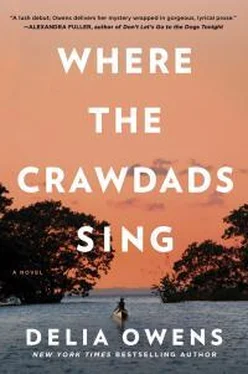He turned to her, still standing in the doorway. “Kya, these are wonderful, beautifully detailed. You could publish these. This could be a book—lots of books.”
“No, no. They’re just for me. They help me learn, is all.”
“Kya, listen to me. You know better than anybody that the reference books for this area are almost nonexistent. With these notations, technical data, and splendid drawings, these are the books everyone’s been waiting for.” It was true. Ma’s old guidebooks to the shells, plants, birds, and mammals of the area were the only ones printed, and they were pitifully inaccurate, with only simple black-and-white pictures and sketchy information on each entry.
“If I can take a few samples, I’ll find out about a publisher, see what they say.”
She stared, not knowing how to see this. Would she have to go somewhere, meet people? Tate didn’t miss the questions in her eyes.
“You wouldn’t have to leave home. You could mail your samples to a publisher. It would bring some money in. Probably not a huge amount, but maybe you wouldn’t have to dig mussels the rest of your life.”
Still, Kya didn’t say anything. Once again Tate was nudging her to care for herself, not just offering to care for her. It seemed that all her life, he had been there. Then gone.
“Give it a try, Kya. What can it hurt?”
She finally agreed that he could take some samples, and he chose a selection of soft watercolors of shells and the great blue heron because of her detailed sketches of the bird in each season, and a delicate oil of the curved eyebrow feather.
Tate lifted the painting of the feather—a profusion of hundreds of the thinnest brushstrokes of rich colors culminating into a deep black so reflective it seemed sunlight was touching the canvas. The detail of a slight tear in the shaft was so distinctive that both Tate and Kya realized at the same second that this was a painting of the very first feather he’d gifted her in the forest. They looked up from the feather into each other’s eyes. She turned away from him. Forcing herself not to feel. She would not be drawn back to someone she couldn’t trust.
He stepped up to her and touched her shoulder. Tried gently to turn her around. “Kya, I’m so sorry about leaving you. Please, can’t you forgive me?”
Finally, she turned and looked at him. “I don’t know how to, Tate. I could never believe you again. Please, Tate, you have to go now.”
“I know. Thank you for listening to me, for giving me this chance to apologize.” He waited for a beat, but she said no more. At least he was leaving with something. The hope for a publisher was a reason to contact her again.
“Good-bye, Kya.” She didn’t answer. He stared at her, and she looked into his eyes but then turned away. He walked out the door toward his boat.
She waited until he was gone, then sat on the damp, cold sand of the lagoon waiting for Chase. Speaking out loud, she repeated the words she’d said to Tate. “Chase may not be perfect, but you’re worse.”
But as she stared deep into the dark waters, Tate’s words about Chase—“ drive away after a party with a blonde in his pickup ”—wouldn’t leave her mind.
• • •
CHASE DIDN’T COME until a week after Christmas. Pulling into the lagoon, he said he could stay all night, ring in the New Year together. Arm in arm, they walked to the shack, where the same fog, it seemed, draped across the roof. After lovemaking, they cuddled in blankets around the stove. The dense air couldn’t hold another molecule of moisture, so when the kettle boiled, heavy droplets swelled on the cool windowpanes.
Chase slipped the harmonica from his pocket and, pressing it along his lips, played the wistful tune “Molly Malone.” “Now her ghost wheels her barrow through the streets broad and narrow, singing cockles and mussels, alive, alive-o.”
It seemed to Kya that when Chase played these melancholy tunes was when he most had a soul.
28. The Shrimper
1969
At beer time the Dog-Gone served up better gossip than the diner. The sheriff and Joe stepped inside the elongated, jam-packed beer hall and up to the bar, made from a single longleaf pine, which extended down the left side of the room, seemingly out of sight into the dim. Locals—all men, since women weren’t allowed—bunched up to the bar or sat at scattered tables. The two barkeeps roasted hot dogs; fried shrimp, oysters, and hush puppies; stirred grits; poured beers and bourbon. The only light emitted from various flashing beer signs, giving off an amber glow, like campfires licking whiskered faces. The clonk s and clink s of billiard balls sounded from the back quarter.
Ed and Joe eased into a midbar cluster of fishermen, and as soon as they ordered Millers and fried oysters, the questions began: Anything new? How come there’s no fingerprints; that part true? Ya guys thoughta ol’ man Hanson? He’s crazy as a loon, be just like sump’m he’d do, climb the tower, push off whoever comes along. This ’un got ya bumfuzzled, ain’t it?
Joe facing one way, Ed the other, they rode the buzz. Answering, listening, nodding. Then through the hubbub, the sheriff’s ear caught the corner of an even voice, a balanced tone, and turned to face Hal Miller, shrimper crew for Tim O’Neal.
“Can I talk with ya a minute, Sheriff? Alone?”
Ed backed away from the bar. “Sure can, Hal, come with me.” He led him to a small table next to the wall, and they sat. “Need a refill on that beer?”
“No, fine fer now. Thank ya, though.”
“Something on your mind, Hal?”
“Yeah, sure is. Gotta git her out, too. Been drivin’ me a bit ditty.”
“Let’s have it.”
“Oh man.” Hal shook his head. “I don’t know. May be nothing, either that, or I shoulda told ya sooner. I been haunted by what I seen.”
“Just tell me, Hal. Together, we’ll sort out if it’s important or not.”
“Well, it’s about the Chase Andrews thing. It was the very night he died, well, I was crewing for Tim, and we were comin’ into the bay late, way past midnight, and me and Allen Hunt seen that woman, the one people call the Marsh Girl, motoring just outta the bay.”
“Is that so? How long after midnight?”
“Must’a been ’bout one forty-five in the mornin’.”
“Where was she motoring?”
“Well, that’s the thing, Sheriff. She was headed right toward the fire tower. If she stayed her course, she woulda landed at that little bay out from the tower.”
Ed breathed out. “Yeah, Hal. That’s important info. Very important. Can you be sure it was her?”
“Well, Allen and I talked about it at the time and were pretty sure it was her. I mean, we both thought the same thing. Wondered what the hell she was doin’ out that late, cruisin’ along with no lights on. Lucky we seen her, might’ve run her over. Then we just forgot about it. It was only later I put two and two together and realized it was the same night Chase died at the tower. Well, then I reckoned I better speak up.”
“Did anybody else on the boat see her?”
“Well, I don’t know ’bout that. Others were about, fer sure, we were headin’ in. All hands up. But I never talked to the others ’bout it. Ya know, just no reason to at the time. And haven’t asked ’em since.”
“I understand. Hal, you did the right thing to tell me. It’s your duty to speak up like this. Don’t worry about anything. All you can do is tell me what you saw. I’ll ask you and Allen in to make a statement. Can I buy you that beer now?”
“No, I think I’ll just go on home. G’night.”
“Good night. Thanks again.” As soon as Hal stood, Ed waved for Joe, who had been glancing over every few seconds to read the sheriff’s face. They gave Hal a minute to clear the room with good-byes, then stepped onto the street.
Читать дальше











